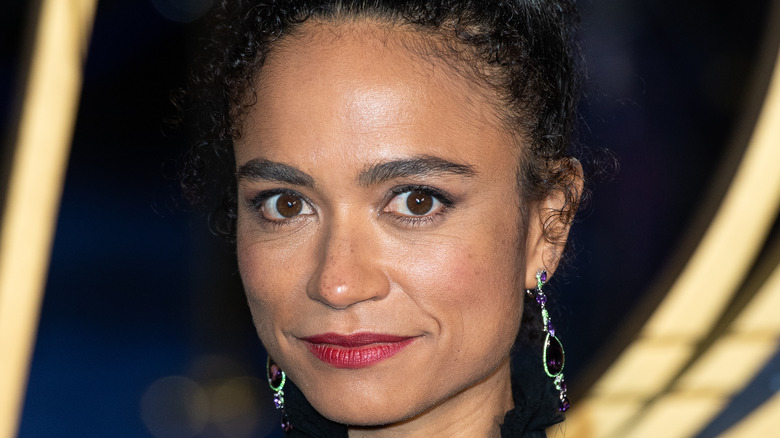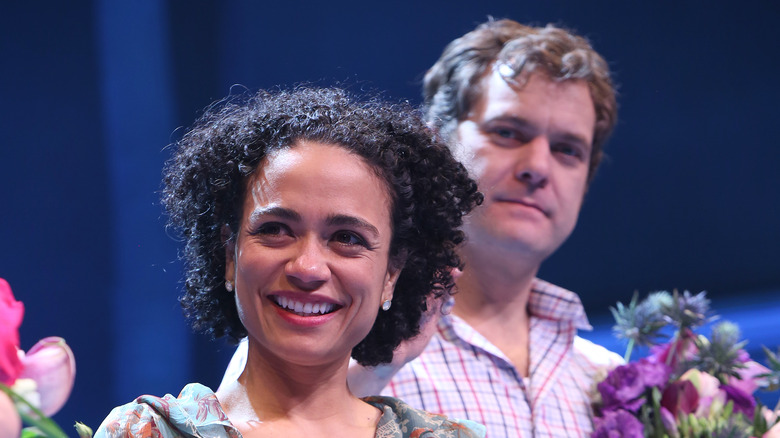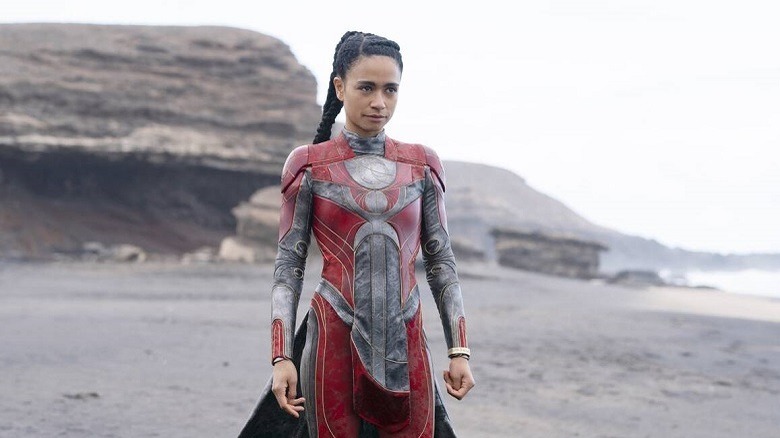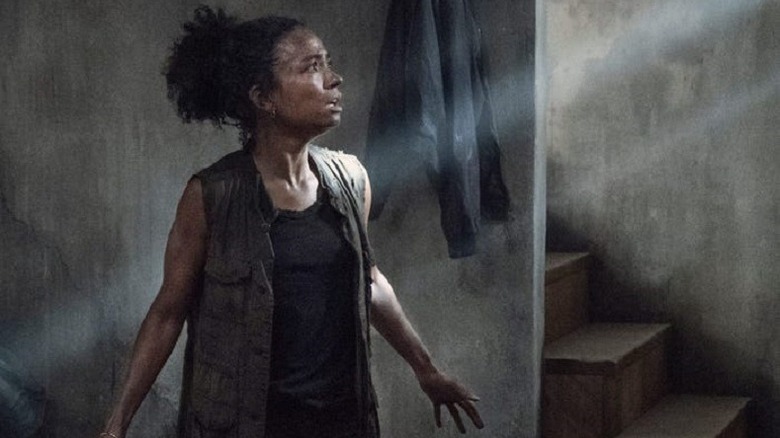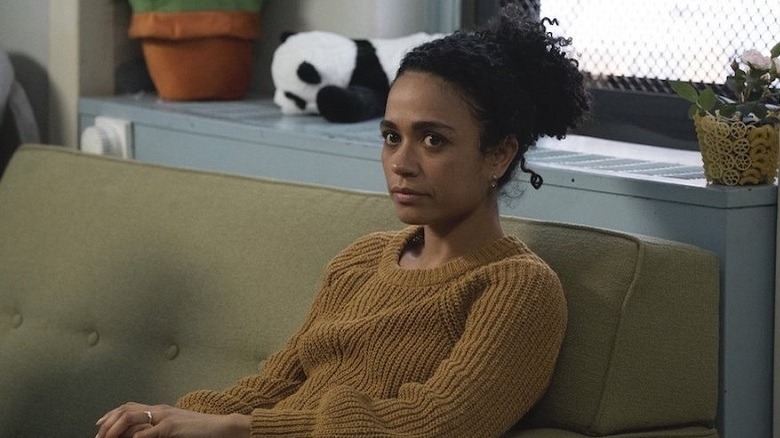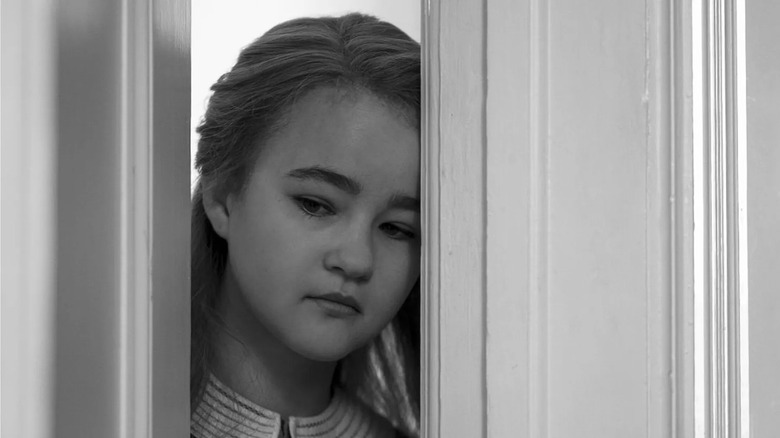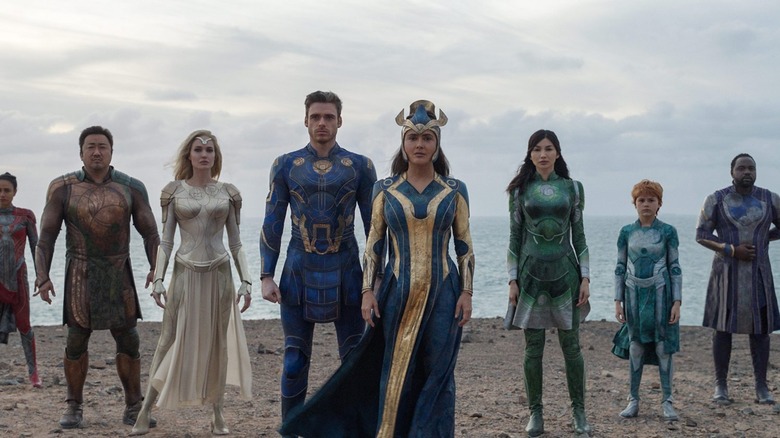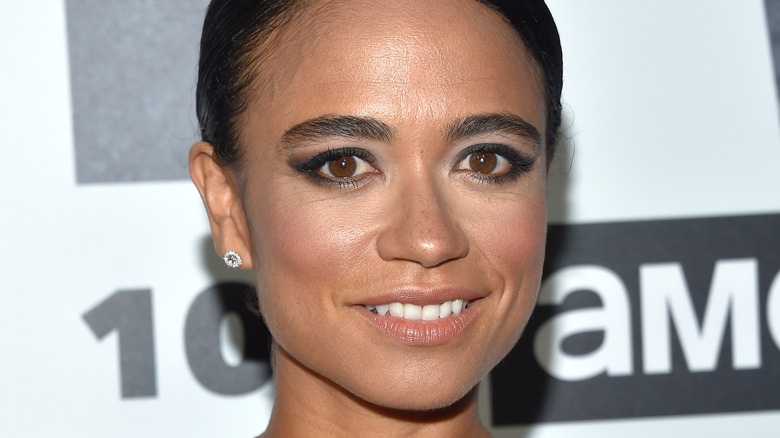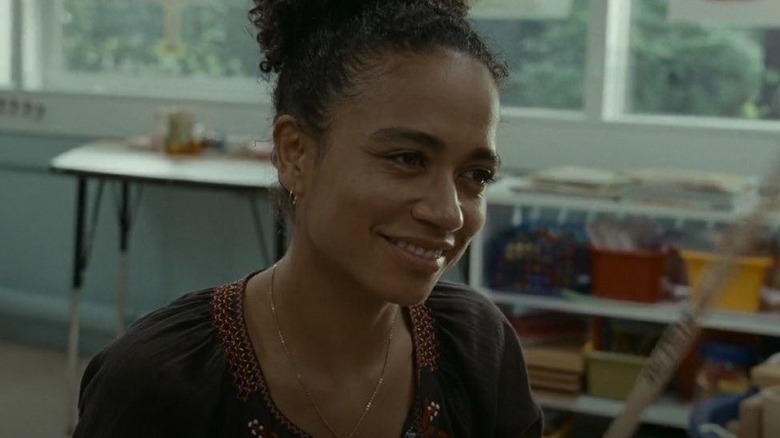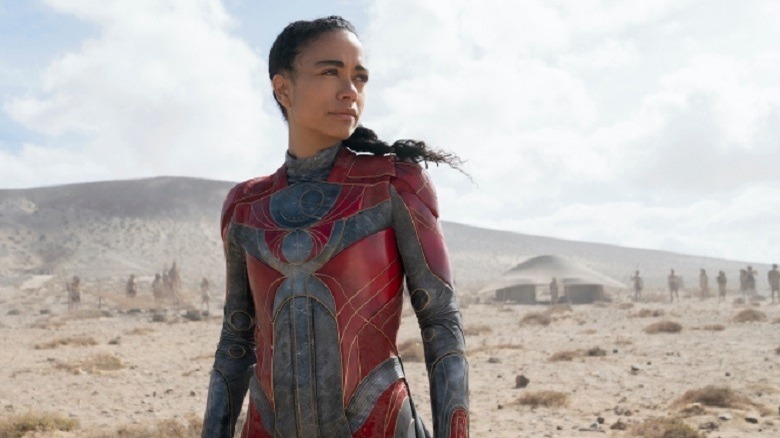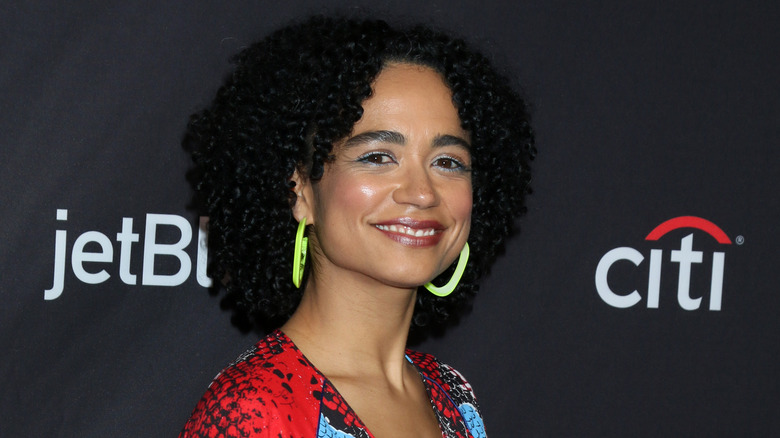The Untold Truth Of Lauren Ridloff
Lauren Ridloff has achieved worldwide fame for playing the Eternal named Makkari in the big Marvel production "Eternals," but even prior to that, she'd established an interesting and rich career blazing a trail as a Deaf actor of color. Her journey to this point has been an improbable one — while she dabbled in acting in high school, it was only one of many interests that included sculpture and cheerleading. When she went to college, she was headed toward what she thought would be a career as a writer and educator.
In a story worthy of Hollywood in itself, she went from being an advisor on American Sign Language for the arts to actually being an actor whose electrifying performances became celebrated by critics. On a whim, she sent an audition tape to one of her favorite television shows, "The Walking Dead," and ended up becoming an integral part of its cast. That led to her landing the role of Makkari — and a version of the character that flipped every aspect of the original except one: Ridloff loves running, and her physicality onscreen made her ideal for Makkari the speedster. Let's take a look at the fascinating paths Lauren Ridloff's career has taken as "Eternals" makes her an even bigger star.
Finding a voice
While Ridloff had a varied career prior to becoming an actor, the entire story surrounding how she got the key role of Sarah (and a Tony nomination) in the 2018 Broadway revival of "Children of a Lesser God" is almost too good to be true. The play is about a young Deaf woman and her complicated romantic relationship with a language instructor for the deaf. A key aspect of the play is Sarah's unwillingness to vocalize.
Ridloff was hired by director Kenny Leon because he wanted to meet with a deaf person. Having given birth to her second child, Ridloff viewed it as "a good excuse to get me out of the house once a week. He really got me out of the house!" Leon was so impressed by her that he kept telling her he wanted to make her a formal consultant and/or assistant for the show.
She didn't suspect that she would ever be considered as an actor for the play, given that she had very little experience as a performer. She was brought in under the pretense of helping with auditions, so when she was told to read for the role, she didn't quite understand what was going on. She was terrified of the notion of using her speaking voice during the reading, but despite her reluctance, she wowed everyone in the room and got the part. Reflecting on the experience, Ridloff said "I have reclaimed my body in its entirety, specifically my voice."
Making a mark with The Eternals
Lauren Ridloff has been open about the accommodations she requested as a Deaf person on the set of "Eternals." As she noted to the New York Times, "In some scenes, I had to face a wall. As a Deaf person, how do you cue me? At one point, I was sharing my frustration with ... Angelina Jolie at a holiday party after a day of shooting. And she immediately made a suggestion: why don't we use a laser pen that special effects can easily erase? It was an 'Aha, wow' moment. Whenever I'm looking at a wall, the interpreters would use a laser pen to make a circle on the wall — 'rolling, rolling, rolling' — and once it went away that meant, 'Action!'"
That was just a part of the process when she understood that she wasn't the only member of the cast who was advocating for her own needs. As Ridloff told The Hollywood Reporter, "The common shared goal for all of us is that we want to be able to deliver. How do I deliver? I need these certain things in place. That moment of realization came to me while I was sitting in hair and makeup right next to Brian Tyree Henry, and he was talking about Black hair. I realized at that moment, he had very specific needs, and there was no shame in asking for what he needed so he could deliver. I think that was a huge moment for myself."
Walking Fan
Before joining the cast of the show, Lauren Ridloff was so obsessed with "The Walking Dead" that she had her husband put an iPad up to the television screen and FaceTime it to her while she fed their infant son in a different room. When she saw an opportunity to play Connie, a character being introduced in the show's ninth season, she sent in an audition tape. Connie was not a Deaf character in the source material, but the show not only adjusted to this, they sometimes made it a key part of the storytelling.
For example, there's the episode in which she rescues a baby from the walkers and has to run through a cornfield thick with zombies. By filming the scene from her point of view, with no sound, the show really ramped up the intensity of the moment. Ridloff's commitment to the role did not go unnoticed: TV Guide named her the best newcomer of the 2018-'19 television season.
The actors who appear with her on "The Walking Dead" are trained in American Sign Language, and the crew has begun to learn it as well. "I love coming to work to see what new phrases they've learned on their own by looking through ASL apps or YouTube," said Ridloff. "It's great."
New Amsterdam
Ridloff's role on "The Walking Dead" opened up other acting opportunities before "Eternals" came along, including a meaty role in "Happy Place," a 2019 episode of the NBC medical drama "New Amsterdam," as a Deaf, LGBTQ character who had received a cochlear implant designed to restore hearing. It's a storyline that Ridloff said was "so surprising to see ... play out on a television hospital drama."
Ridloff's character, Margot, ultimately opts to have her implant removed when she realizes she isn't happy with the results. "I was concerned about playing a person with a CI because I do not have CIs myself," admitted Ridloff. "I reached out to three friends who are Deaf and have CIs to make sure that they felt that this portrayal was fair. One wished I wouldn't take this role. One thought I was a great choice. And the other friend who is a fellow actor also understood the stakes of playing someone outside of my realm. There are so many people who are perfectly happy with their CIs. There are also many people who identify themselves as capital Deaf and have gone under the knife for a CI, either out of sheer curiosity or for enhancement of what they already have. And they've stopped using their CIs because it did not meet their expectations. This episode just adds another layer to the whole Deaf narrative."
Wonderstruck
Lauren Ridloff's first role in a widely distributed Hollywood film came courtesy of 2017's "Wonderstruck," a Todd Haynes film focusing on two Deaf children whose stories magically converge on New York City despite being set 50 years apart. One character, a deaf girl named Rose (played by deaf actress Millicent Simmonds) seeks out an actor from the silent movie era. In the 1970s, a boy named Ben loses his hearing and runs away from home in order to find his father. Rose's portion of the film is presented in black and white, with no sound but the score, just like a silent film.
Ridloff acted as a consultant for Haynes, a director whose dedication to the accuracy of his craft is well-known. Though she didn't expect it, she was also given a role as a maid named Pearl. Ridloff's ability to make an impression was powerful, something that Haynes obviously recognized — and something many others would soon recognize.
Representation matters
Lauren Ridloff is well aware of what her presence as a Deaf actor means in "Eternals." She's said she felt isolated as a Deaf girl, but understands as an adult how many Deaf people there are. As she told the New York Times, "Growing up, I didn't dream about becoming an actor. I didn't see myself on the screen. Now, as an adult, I'm aware there are at least 466 million deaf people and hard-of-hearing people out there. I'm not the only one. And that's what it means to have a Deaf superhero — a lot more people will see a lot more possibility."
However, while she understands that her Deafness is a trait that most people are curious about, she's also said that it was important to consider the fact that she's Black and Latina. "My Deaf identity compared to my Black identity or my Latina identity, I think there's this vacillation sometimes, and it just changes depending on the situation that I'm in or the story that I'm telling," she explained. "I'm also learning now that I can't separate my Deaf narrative from my other identities. So it's when I'm speaking about my other identities that a more clear understanding of my Deaf experience comes through."
Miss Deaf America
Lauren Ridloff went to a high school for the deaf in Washington, where she blossomed being around her peers. She went to college at Cal State Northridge, in part because the presence of the National Center on Deafness. Expanding her range as a performer, she became a hip-hop dancer. After she graduated in 2000, she won the Miss Deaf America contest, sponsored by the National Association of the Deaf. She was the first black and Latinx contestant to win the award. She read Shel Silverstein's book, "The Giving Tree," in ASL to present one of her talents as a contestant.
Winning the pageant made her a national spokeswoman for the deaf, which meant really coming out of her shell and learning how to engage the public. She specialized in reading books to children, as she had her goals set on education and encouraging literacy. As someone who'd grown up as a shy child who felt out of step with her peers because of her ethnic background and deafness, she reflected, "I hope [kids] will see me and think, 'Hey, she's different and I'm different too.' I hope that children, the disadvantaged, as well as the advantaged ones, will see that being different is fabulous!"
From teacher to performer
After her stint as Miss Deaf America, Lauren Ridloff graduated with a master's degree in education and became a kindergarten and first grade teacher in New York. She quit that job when she had her children a few years later, opting to be a stay-at-home mom for a while and putting her writing skills to use with a popular mommy blog. Of teaching, she said "My goal growing up was to write a book. That's why I studied English and creative writing in college, and that is a big reason I started teaching. I wanted to write children's books. I felt that the best way to understand how a child thinks in their mind is to be with them all day. So I started teaching because of that. I didn't dream of acting."
Ridloff was also passionate about advocating for American Sign Language, working with the SignTalk Foundation to develop continuing education videos for sign language interpreters. She won an award from the foundation in 2018 for her service.
Speaking of teaching, Ridloff played an ASL teacher in the 2019 film "Sound Of Metal." The story follows a heavy metal drummer who starts to lose his hearing; Ridloff's role is small but important, as she teaches him ASL and slowly draws him out of his emotional spiral.
Flipping the script on Makkari
As imagined by Marvel creator Jack Kirby, Makkari is a tall, blonde, and muscular man who can hear. When asked about this rather dramatic departure from the source material, Ridloff told the New York Times, "To be honest, I don't know much about how they made that decision. But I love that they decided to make Makkari everything he's not in the comic books — he's a huge guy, let's find someone tiny. He's blond, let's find someone who has Black hair. He's a man, let's go with a woman. He's hearing, and now the character's deaf."
Director Chloé Zhao went further than that. Ridloff didn't even audition for the part. Zhao and producer Nate Moore called her in and talked in general terms about a new Marvel project and the character of Makkari. As Ridloff told the Hollywood Reporter, "Chloé wanted to know who I was, so we spent some time talking about my upbringing, my interests, my passions." After this initial process, Ridloff "went down 'The Eternals' rabbit hole and read as much as I could, both Jack Kirby's version and Neil Gaiman's version."
When offered the role, she had a hand in shaping Makkari: "We ... talked about Makkari and her relationship with the other characters and how she interacts with the other characters ... We did talk about how Makkari's powers work with her Deafness."
Sign Gene
Lauren Ridloff may be playing the first deaf superhero in the MCU, but this isn't the first time she's played a deaf superhero in a movie: She had a small role as a superpowered agent in 2017's "Sign Gene." Written and directed by Emilio Insolera, "Sign Gene" imagines a world in which a small sub-population of deaf people have a mutant gene that gives them access to powers that they express through sign language.
It's a film about deaf characters created by deaf people, which is a rarity in Hollywood. Insolera deliberately aimed this entertaining action film at a general audience, and the visual language he created in expressing powers was clever and fascinating. For example, when one agent signs "weapon," his hands morph into fire-spewing guns. Insolera wanted to avoid the tired cliché of deaf people appearing to be victims by tying superpowers directly into their deafness, with some choosing good and others evil. Ridloff played one of many agents hunting down a rogue super-powered deaf villain trying to wipe out the gene in all other deaf people.
